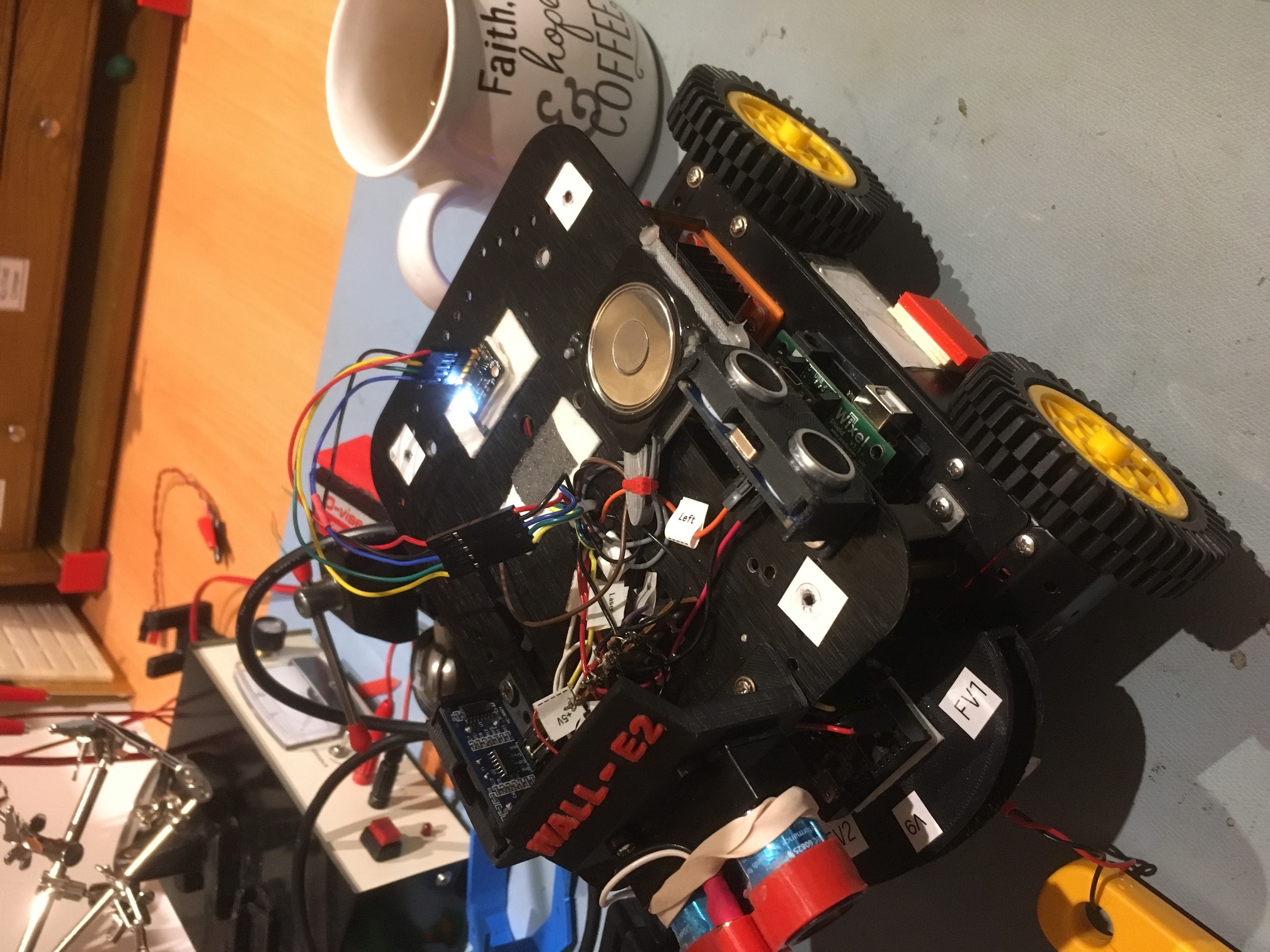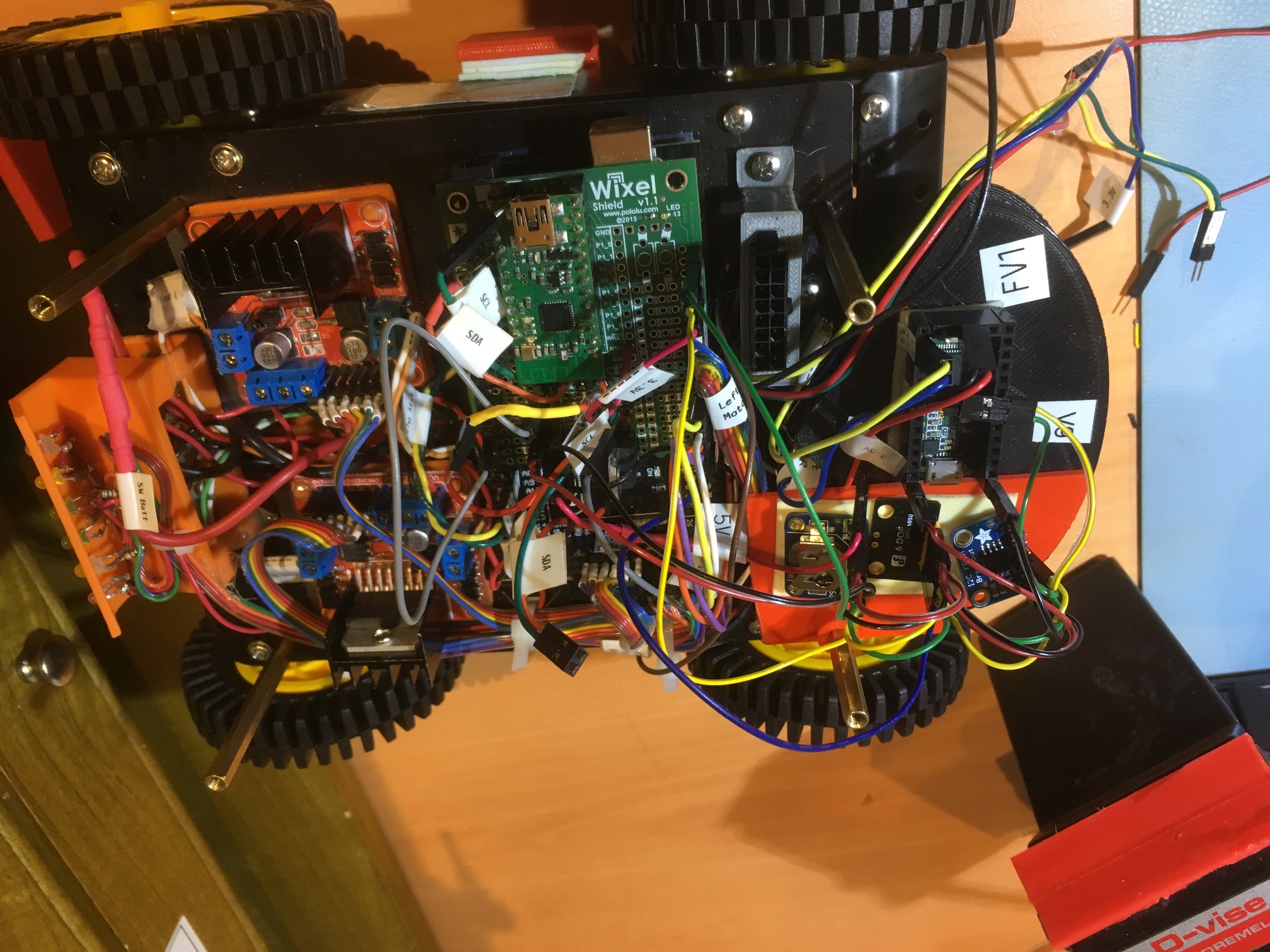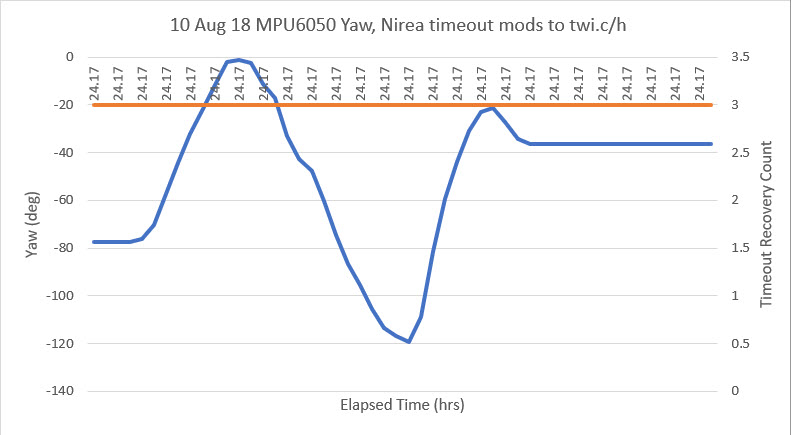/*
twi.c - TWI/I2C library for Wiring & Arduino
Copyright (c) 2006 Nicholas Zambetti. All right reserved.
This library is free software; you can redistribute it and/or
modify it under the terms of the GNU Lesser General Public
License as published by the Free Software Foundation; either
version 2.1 of the License, or (at your option) any later version.
This library is distributed in the hope that it will be useful,
but WITHOUT ANY WARRANTY; without even the implied warranty of
MERCHANTABILITY or FITNESS FOR A PARTICULAR PURPOSE. See the GNU
Lesser General Public License for more details.
You should have received a copy of the GNU Lesser General Public
License along with this library; if not, write to the Free Software
Foundation, Inc., 51 Franklin St, Fifth Floor, Boston, MA 02110-1301 USA
Modified 2012 by Todd Krein (todd@krein.org) to implement repeated starts
*/
//08/09/18 this file has been merged with unaie's version of twi.c, modified to recover from infinite hang conditions
//see http://forum.arduino.cc/index.php/topic,19624.0.html for details
//this file should be renamed 'twi.c' and placed so that it gets used instead of the normal one.
#include <math.h>
#include <stdlib.h>
#include <inttypes.h>
#include <avr/io.h>
#include <avr/interrupt.h>
#include <compat/twi.h>
#include "Arduino.h" // for digitalWrite
#ifndef cbi
#define cbi(sfr, bit) (_SFR_BYTE(sfr) &= ~_BV(bit))
#endif
#ifndef sbi
#define sbi(sfr, bit) (_SFR_BYTE(sfr) |= _BV(bit))
#endif
#include "pins_arduino.h"
#include "twi.h"
static volatile uint8_t trcase;//Nir
static volatile uint8_t twi_state;
static volatile uint8_t twi_slarw;
static volatile uint8_t twi_sendStop; // should the transaction end with a stop
static volatile uint8_t twi_inRepStart; // in the middle of a repeated start
static void (*twi_onSlaveTransmit)(void);
static void (*twi_onSlaveReceive)(uint8_t*, int);
static uint8_t twi_masterBuffer[TWI_BUFFER_LENGTH];
static volatile uint8_t twi_masterBufferIndex;
static volatile uint8_t twi_masterBufferLength;
static uint8_t twi_txBuffer[TWI_BUFFER_LENGTH];
static volatile uint8_t twi_txBufferIndex;
static volatile uint8_t twi_txBufferLength;
static uint8_t twi_rxBuffer[TWI_BUFFER_LENGTH];
static volatile uint8_t twi_rxBufferIndex;
static volatile uint8_t twi_error;
//08/09/18 gfp - added to monitor lockup recoveries
static uint16_t lockup_recovery_count = 0;
/*
* Function twi_init
* Desc readys twi pins and sets twi bitrate
* Input none
* Output none
*/
void twi_init(void)
{
// disable twi module (to allow for reinitialize)
TWCR = 0; //08/09/18 - required to get TWI to re-init
// initialize state
twi_state = TWI_READY;
twi_sendStop = true; // default value
twi_inRepStart = false;
// activate internal pullups for twi.
digitalWrite(SDA, 1);
digitalWrite(SCL, 1);
// initialize twi prescaler and bit rate
cbi(TWSR, TWPS0);
cbi(TWSR, TWPS1);
TWBR = ((F_CPU / TWI_FREQ) - 16) / 2;
/* twi bit rate formula from atmega128 manual pg 204
SCL Frequency = CPU Clock Frequency / (16 + (2 * TWBR))
note: TWBR should be 10 or higher for master mode
It is 72 for a 16mhz Wiring board with 100kHz TWI */
// enable twi module, acks, and twi interrupt
TWCR = _BV(TWEN) | _BV(TWIE) | _BV(TWEA);
}
/*
* Function twi_disable
* Desc disables twi pins
* Input none
* Output none
*/
void twi_disable(void)
{
// disable twi module, acks, and twi interrupt
TWCR &= ~(_BV(TWEN) | _BV(TWIE) | _BV(TWEA));
// deactivate internal pullups for twi.
digitalWrite(SDA, 0);
digitalWrite(SCL, 0);
}
/*
* Function twi_slaveInit
* Desc sets slave address and enables interrupt
* Input none
* Output none
*/
void twi_setAddress(uint8_t address)
{
// set twi slave address (skip over TWGCE bit)
TWAR = address << 1;
}
/*
* Function twi_setClock
* Desc sets twi bit rate
* Input Clock Frequency
* Output none
*/
void twi_setFrequency(uint32_t frequency)
{
TWBR = ((F_CPU / frequency) - 16) / 2;
/* twi bit rate formula from atmega128 manual pg 204
SCL Frequency = CPU Clock Frequency / (16 + (2 * TWBR))
note: TWBR should be 10 or higher for master mode
It is 72 for a 16mhz Wiring board with 100kHz TWI */
}
/*
* Function twi_readFrom
* Desc attempts to become twi bus master and read a
* series of bytes from a device on the bus
* Input address: 7bit i2c device address
* data: pointer to byte array
* length: number of bytes to read into array
* sendStop: Boolean indicating whether to send a stop at the end
* Output number of bytes read
*/
uint8_t twi_readFrom(uint8_t address, uint8_t* data, uint8_t length, uint8_t sendStop)
{
uint8_t i;
// ensure data will fit into buffer
if(TWI_BUFFER_LENGTH < length){
return 0;
}
// wait until twi is ready, become master receiver
twi_tout(1);//Ini TimeOut
while(TWI_READY != twi_state){
if (twi_tout(0)) break;
continue;
}
twi_state = TWI_MRX;
twi_sendStop = sendStop;
// reset error state (0xFF.. no error occured)
twi_error = 0xFF;
// initialize buffer iteration vars
twi_masterBufferIndex = 0;
twi_masterBufferLength = length-1; // This is not intuitive, read on...
// On receive, the previously configured ACK/NACK setting is transmitted in
// response to the received byte before the interrupt is signalled.
// Therefor we must actually set NACK when the _next_ to last byte is
// received, causing that NACK to be sent in response to receiving the last
// expected byte of data.
// build sla+w, slave device address + w bit
twi_slarw = TW_READ;
twi_slarw |= address << 1;
if (true == twi_inRepStart) {
// if we're in the repeated start state, then we've already sent the start,
// (@@@ we hope), and the TWI statemachine is just waiting for the address byte.
// We need to remove ourselves from the repeated start state before we enable interrupts,
// since the ISR is ASYNC, and we could get confused if we hit the ISR before cleaning
// up. Also, don't enable the START interrupt. There may be one pending from the
// repeated start that we sent ourselves, and that would really confuse things.
twi_inRepStart = false; // remember, we're dealing with an ASYNC ISR
do {
TWDR = twi_slarw;
} while(TWCR & _BV(TWWC));
TWCR = _BV(TWINT) | _BV(TWEA) | _BV(TWEN) | _BV(TWIE); // enable INTs, but not START
}
else
// send start condition
TWCR = _BV(TWEN) | _BV(TWIE) | _BV(TWEA) | _BV(TWINT) | _BV(TWSTA);
// wait for read operation to complete
twi_tout(1);
while(TWI_MRX == twi_state){
if (twi_tout(0)) break;
continue;
}
if (twi_masterBufferIndex < length)
length = twi_masterBufferIndex;
// copy twi buffer to data
for(i = 0; i < length; ++i){
data[i] = twi_masterBuffer[i];
}
return length;
}
/*
* Function twi_writeTo
* Desc attempts to become twi bus master and write a
* series of bytes to a device on the bus
* Input address: 7bit i2c device address
* data: pointer to byte array
* length: number of bytes in array
* wait: boolean indicating to wait for write or not
* sendStop: boolean indicating whether or not to send a stop at the end
* Output 0 .. success
* 1 .. length to long for buffer
* 2 .. address send, NACK received
* 3 .. data send, NACK received
* 4 .. other twi error (lost bus arbitration, bus error, ..)
*/
uint8_t twi_writeTo(uint8_t address, uint8_t* data, uint8_t length, uint8_t wait, uint8_t sendStop)
{
uint8_t i;
// ensure data will fit into buffer
if(TWI_BUFFER_LENGTH < length){
return 1;
}
// wait until twi is ready, become master transmitter
twi_tout(1);
while(TWI_READY != twi_state){
if (twi_tout(0)) return 5;
continue;
}
twi_state = TWI_MTX;
twi_sendStop = sendStop;
// reset error state (0xFF.. no error occured)
twi_error = 0xFF;
// initialize buffer iteration vars
twi_masterBufferIndex = 0;
twi_masterBufferLength = length;
// copy data to twi buffer
for(i = 0; i < length; ++i){
twi_masterBuffer[i] = data[i];
}
// build sla+w, slave device address + w bit
twi_slarw = TW_WRITE;
twi_slarw |= address << 1;
// if we're in a repeated start, then we've already sent the START
// in the ISR. Don't do it again.
//
if (true == twi_inRepStart) {
// if we're in the repeated start state, then we've already sent the start,
// (@@@ we hope), and the TWI statemachine is just waiting for the address byte.
// We need to remove ourselves from the repeated start state before we enable interrupts,
// since the ISR is ASYNC, and we could get confused if we hit the ISR before cleaning
// up. Also, don't enable the START interrupt. There may be one pending from the
// repeated start that we sent outselves, and that would really confuse things.
twi_inRepStart = false; // remember, we're dealing with an ASYNC ISR
do {
TWDR = twi_slarw;
} while(TWCR & _BV(TWWC));
TWCR = _BV(TWINT) | _BV(TWEA) | _BV(TWEN) | _BV(TWIE); // enable INTs, but not START
}
else
// send start condition
TWCR = _BV(TWINT) | _BV(TWEA) | _BV(TWEN) | _BV(TWIE) | _BV(TWSTA); // enable INTs
// wait for write operation to complete
twi_tout(1);
while(wait && (TWI_MTX == twi_state)){
if (twi_tout(0)) return 5;
continue;
}
if (twi_error == 0xFF)
return 0; // success
else if (twi_error == TW_MT_SLA_NACK)
return 2; // error: address send, nack received
else if (twi_error == TW_MT_DATA_NACK)
return 3; // error: data send, nack received
else
return 4; // other twi error
}
/*
* Function twi_transmit
* Desc fills slave tx buffer with data
* must be called in slave tx event callback
* Input data: pointer to byte array
* length: number of bytes in array
* Output 1 length too long for buffer
* 2 not slave transmitter
* 0 ok
*/
uint8_t twi_transmit(const uint8_t* data, uint8_t length)
{
uint8_t i;
// ensure data will fit into buffer
if(TWI_BUFFER_LENGTH < (twi_txBufferLength+length)){
return 1;
}
// ensure we are currently a slave transmitter
if(TWI_STX != twi_state){
return 2;
}
// set length and copy data into tx buffer
for(i = 0; i < length; ++i){
twi_txBuffer[twi_txBufferLength+i] = data[i];
}
twi_txBufferLength += length;
return 0;
}
/*
* Function twi_attachSlaveRxEvent
* Desc sets function called before a slave read operation
* Input function: callback function to use
* Output none
*/
void twi_attachSlaveRxEvent( void (*function)(uint8_t*, int) )
{
twi_onSlaveReceive = function;
}
/*
* Function twi_attachSlaveTxEvent
* Desc sets function called before a slave write operation
* Input function: callback function to use
* Output none
*/
void twi_attachSlaveTxEvent( void (*function)(void) )
{
twi_onSlaveTransmit = function;
}
/*
* Function twi_reply
* Desc sends byte or readys receive line
* Input ack: byte indicating to ack or to nack
* Output none
*/
void twi_reply(uint8_t ack)
{
// transmit master read ready signal, with or without ack
if(ack){
TWCR = _BV(TWEN) | _BV(TWIE) | _BV(TWINT) | _BV(TWEA);
}else{
TWCR = _BV(TWEN) | _BV(TWIE) | _BV(TWINT);
}
}
/*
* Function twi_stop
* Desc relinquishes bus master status
* Input none
* Output none
*/
void twi_stop(void)
{
// send stop condition
TWCR = _BV(TWEN) | _BV(TWIE) | _BV(TWEA) | _BV(TWINT) | _BV(TWSTO);
// wait for stop condition to be exectued on bus
// TWINT is not set after a stop condition!
twi_tout(1);
while(TWCR & _BV(TWSTO)){
if (twi_tout(0)) return;
continue;
}
// update twi state
twi_state = TWI_READY;
}
/*
* Function twi_releaseBus
* Desc releases bus control
* Input none
* Output none
*/
void twi_releaseBus(void)
{
// release bus
TWCR = _BV(TWEN) | _BV(TWIE) | _BV(TWEA) | _BV(TWINT);
// update twi state
twi_state = TWI_READY;
}
//Nirea. Time Out
static volatile uint32_t twi_toutc;
uint8_t twi_tout(uint8_t ini)
{
if (ini) twi_toutc=0; else twi_toutc++;
if (twi_toutc>=100000UL) {
twi_toutc=0;
twi_init();
lockup_recovery_count++;
return 1;
}
return 0;
}
void twi_clearRecoveryCount() //08/09/18 gfp for monitoring purposes
{
lockup_recovery_count = 0;
}
uint16_t twi_getRecoveryCount() //08/09/18 gfp for monitoring purposes
{
return lockup_recovery_count;
}
ISR(TWI_vect)
{
switch(TW_STATUS){
// All Master
case TW_START: // sent start condition
case TW_REP_START: // sent repeated start condition
// copy device address and r/w bit to output register and ack
TWDR = twi_slarw;
twi_reply(1);
break;
// Master Transmitter
case TW_MT_SLA_ACK: // slave receiver acked address
case TW_MT_DATA_ACK: // slave receiver acked data
// if there is data to send, send it, otherwise stop
if(twi_masterBufferIndex < twi_masterBufferLength){
// copy data to output register and ack
TWDR = twi_masterBuffer[twi_masterBufferIndex++];
twi_reply(1);
}else{
if (twi_sendStop)
twi_stop();
else {
twi_inRepStart = true; // we're gonna send the START
// don't enable the interrupt. We'll generate the start, but we
// avoid handling the interrupt until we're in the next transaction,
// at the point where we would normally issue the start.
TWCR = _BV(TWINT) | _BV(TWSTA)| _BV(TWEN) ;
twi_state = TWI_READY;
}
}
break;
case TW_MT_SLA_NACK: // address sent, nack received
twi_error = TW_MT_SLA_NACK;
twi_stop();
break;
case TW_MT_DATA_NACK: // data sent, nack received
twi_error = TW_MT_DATA_NACK;
twi_stop();
break;
case TW_MT_ARB_LOST: // lost bus arbitration
twi_error = TW_MT_ARB_LOST;
twi_releaseBus();
break;
// Master Receiver
case TW_MR_DATA_ACK: // data received, ack sent
// put byte into buffer
twi_masterBuffer[twi_masterBufferIndex++] = TWDR;
case TW_MR_SLA_ACK: // address sent, ack received
// ack if more bytes are expected, otherwise nack
if(twi_masterBufferIndex < twi_masterBufferLength){
twi_reply(1);
}else{
twi_reply(0);
}
break;
case TW_MR_DATA_NACK: // data received, nack sent
// put final byte into buffer
twi_masterBuffer[twi_masterBufferIndex++] = TWDR;
if (twi_sendStop)
twi_stop();
else {
twi_inRepStart = true; // we're gonna send the START
// don't enable the interrupt. We'll generate the start, but we
// avoid handling the interrupt until we're in the next transaction,
// at the point where we would normally issue the start.
TWCR = _BV(TWINT) | _BV(TWSTA)| _BV(TWEN) ;
twi_state = TWI_READY;
}
break;
case TW_MR_SLA_NACK: // address sent, nack received
twi_stop();
break;
// TW_MR_ARB_LOST handled by TW_MT_ARB_LOST case
// Slave Receiver
case TW_SR_SLA_ACK: // addressed, returned ack
case TW_SR_GCALL_ACK: // addressed generally, returned ack
case TW_SR_ARB_LOST_SLA_ACK: // lost arbitration, returned ack
case TW_SR_ARB_LOST_GCALL_ACK: // lost arbitration, returned ack
// enter slave receiver mode
twi_state = TWI_SRX;
// indicate that rx buffer can be overwritten and ack
twi_rxBufferIndex = 0;
twi_reply(1);
break;
case TW_SR_DATA_ACK: // data received, returned ack
case TW_SR_GCALL_DATA_ACK: // data received generally, returned ack
// if there is still room in the rx buffer
if(twi_rxBufferIndex < TWI_BUFFER_LENGTH){
// put byte in buffer and ack
twi_rxBuffer[twi_rxBufferIndex++] = TWDR;
twi_reply(1);
}else{
// otherwise nack
twi_reply(0);
}
break;
case TW_SR_STOP: // stop or repeated start condition received
// ack future responses and leave slave receiver state
twi_releaseBus();
// put a null char after data if there's room
if(twi_rxBufferIndex < TWI_BUFFER_LENGTH){
twi_rxBuffer[twi_rxBufferIndex] = '\0';
}
// callback to user defined callback
twi_onSlaveReceive(twi_rxBuffer, twi_rxBufferIndex);
// since we submit rx buffer to "wire" library, we can reset it
twi_rxBufferIndex = 0;
break;
case TW_SR_DATA_NACK: // data received, returned nack
case TW_SR_GCALL_DATA_NACK: // data received generally, returned nack
// nack back at master
twi_reply(0);
break;
// Slave Transmitter
case TW_ST_SLA_ACK: // addressed, returned ack
case TW_ST_ARB_LOST_SLA_ACK: // arbitration lost, returned ack
// enter slave transmitter mode
twi_state = TWI_STX;
// ready the tx buffer index for iteration
twi_txBufferIndex = 0;
// set tx buffer length to be zero, to verify if user changes it
twi_txBufferLength = 0;
// request for txBuffer to be filled and length to be set
// note: user must call twi_transmit(bytes, length) to do this
twi_onSlaveTransmit();
// if they didn't change buffer & length, initialize it
if(0 == twi_txBufferLength){
twi_txBufferLength = 1;
twi_txBuffer[0] = 0x00;
}
// transmit first byte from buffer, fall
case TW_ST_DATA_ACK: // byte sent, ack returned
// copy data to output register
TWDR = twi_txBuffer[twi_txBufferIndex++];
// if there is more to send, ack, otherwise nack
if(twi_txBufferIndex < twi_txBufferLength){
twi_reply(1);
}else{
twi_reply(0);
}
break;
case TW_ST_DATA_NACK: // received nack, we are done
case TW_ST_LAST_DATA: // received ack, but we are done already!
// ack future responses
twi_reply(1);
// leave slave receiver state
twi_state = TWI_READY;
break;
// All
case TW_NO_INFO: // no state information
break;
case TW_BUS_ERROR: // bus error, illegal stop/start
twi_error = TW_BUS_ERROR;
twi_stop();
break;
}
}


